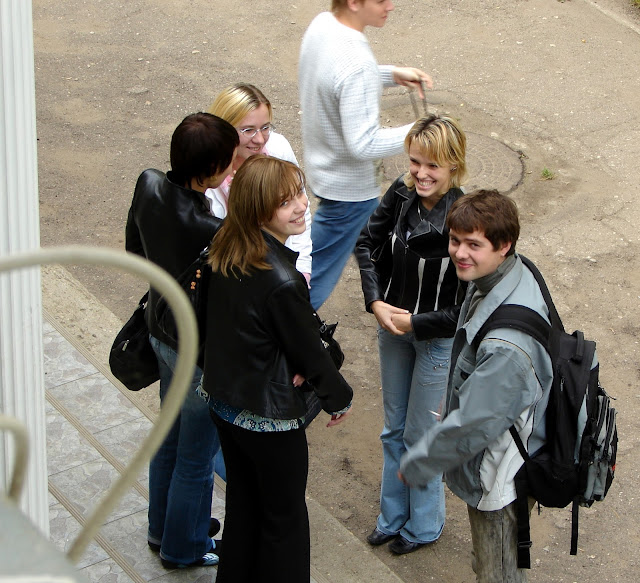The actual content of her book is conveyed more accurately by the subtitle, When Sexes Collide, but she’s not about to forgo the opportunity, provided by recent genetic research, to set up the mischievous frame of our (men’s) possible optional status in the distant future. The Y-chromosome is supposedly shrinking to a theoretical vanishing point, just as the theoretical range of reproductive options for women is increasing.
On another level of optionality, it turns out that men supposedly have a fairly narrow range of utility. (Apparently, from the numerous men thanked by Maureen Dowd in her introduction, that utility includes being able to help her write a book about why they might not be necessary.) We are lazy and aggressive, but useful for lifting heavy things; according to Paul Rudnick, “Men only evolve with a gun at their head. Men want a babe and don’t care about her earning power.”
Her survey of men’s limited utility is unwittingly supported by another recent book, Manliness, by Harvey Mansfield, who frequently defines manliness as one facet or another of aggressiveness: “In the end, aggression is all there is.” Mansfield feels that men have a corner (though not a monopoly) on the ingredient he feels is most indispensable to manliness, “philosophical courage.” But if that is the basis of our indispensability, then we may be in trouble: all it would take to prove the case for our optional status is to disprove the thesis that men are more courageous on behalf of philosophically definable goals than women … or to construct a plausible vision of a world in which such courage is not necessary nearly as often, because society is less threatened by rampant aggression.
Maureen Dowd teases her readers only briefly with this theme of men’s dispensability. Most of the content of her book concerns two interrelated observations, mostly confined to the American scene, and summarized early on:
First: “Little did I realize that the sexual revolution would have the unexpected consequence of intensifying the confusion between the sexes… Or most curious of all, that women would move from playing with Barbie to denouncing Barbie to remaking themselves as Barbie.”
Second: “Whether or not American feminism will be defeated by American conservatism, it is incontrovertibly true that American feminism was trumped by American narcissism.”
In the service of amplifying these observations, Maureen Dowd surveys relationships between men and women, and women’s sense of self, in a variety of settings: How we meet, flirt, date, assess each other, and divide restaurant checks; how we (they?) decide when to get married and have children (or how we recognize or deny the biological and chronological issues involved); how we deal with aging, or don’t; and how all of this affects American politics.
Some of her observations are truly sobering. For example, what does it say about men’s and women’s abilities to see each other clearly and respectfully, when we learn how devastatingly differently we assess the value of intelligence? Dowd quotes a British study that says men’s chances for marriage go up 35% for each 16% increase in IQ, whereas women’s chances go DOWN 40% for each 16% increase in IQ. This intuitively makes no sense at all to me, but Dowd provides lots of anecdotal backup to these statistics.
Another major issue: economist Sylvia Ann Hewlett tells Dowd that it’s more difficult than ten years ago for women to have careers AND raise a family. “The trend lines continue that highly educated women in many countries are increasingly dealing with this creeping non-choice and end up on this path of delaying finding a mate and delaying childbearing. Whether you’re looking at Italy, Russia, or the U.S., all of that is true.”
A point that gave me, as an evangelical Christian, something to think about: “America has always been conflicted about sex, its puritanical side clashing with its prurient side. But now, with the ascendance of the prudish religious right, and the numbing oversexualization of commerce and culture, America seems positively bipolar about sex.” In this context, how do we in fact raise healthy, ethical young people, and then support their ascendance into full citizenship and leadership?
A poignant statistic: In 1990, Americans spent $1 billion on anti-aging creams, pills, devices, and surgery; 2005’s figure was $15 billion.
Now, about my guilt: How can I enjoy a book that is so … frothy? As a readable survey with a huge brief, maybe it can’t help skimming the surface, but Dowd goes from observations about women in Islamic Arabic cultures to Barbie dolls, with zero transition and an almost militant superficiality and bounciness. She’s constantly subverting her own voice of authority with outrageous puns (and I know from puns!) and double entendres for which she supplies … er … flags. As in “... she has, er, put her finger on something.” This sort of breezy commentary is hardly a new genre, but it's one I personally hardly ever read. Serious information is supposed to be delivered by serious people. But maybe the almost flirtatious breeziness of Dowd's book is the ideal vehicle to convey, not just in observation and description but in candid self-reference, a lively impression of the state of personal and sexual identity among some of us.
But of whom? Most Quakers I know would not recognize themselves in any corner of her book. That may be precisely a problem in its own right. How do we communicate with Barbie? If we have no desire to do so, does this say more about us than about Barbie?
Indian summer in Elektrostal:










3 comments:
"Most Quakers I know would not recognize themselves in any corner of her book. That may be precisely a problem in its own right. How do we communicate with Barbie? If we have no desire to do so, does this say more about us than about Barbie?"
Okay, Johan, that does it. You've pushed me over the brink.
I'm adding Cute Overload to my list of recommended blogs at my Earthwitness Journal.
-- As a testimony, Johan!
Wow, you really know how to tap into my guilt! But what drove you over the edge into linking with Cute Overload? Was it my cute photos or Maureen Dowd's cute book?
"The trend lines continue that highly educated women in many countries are increasingly dealing with this creeping non-choice and end up on this path of delaying finding a mate and delaying childbearing. Whether you’re looking at Italy, Russia, or the U.S., all of that is true."
I find this quote very powerful. The whole idea of "the job" (as invented during the industrial revolution) is to give people the income they need to support their family. But business and industry have made "the job" incompatable with family life. Unfortunately, there is very little scrutiny of the whole idea of "the job".
The "nuclear family" is another problematic invention of the past 100 years. With the family whittled down to two adults, there is not enough adult presence to raise a family. It takes a village to raise a child, yet our culture seems to find it acceptable that two frazzled adults can do it.
The jobs and work culture have to change. More self-employment will probably help, since it will put workers back in the driver seat. But the family has to change as well. More adults in the house means less work for everyone.
On another note, the Russia stories are super!
Post a Comment